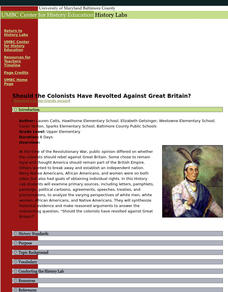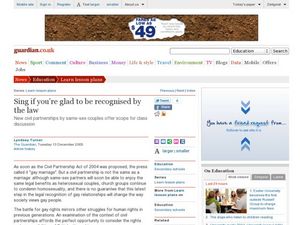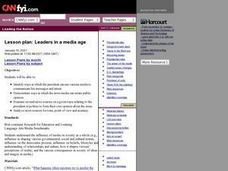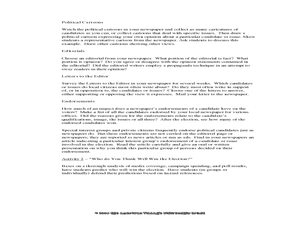C-SPAN
The Electoral College and the Constitution
What is the purpose of the Electoral College? Is it antiquated, or does it have a place in today's political climate? High schoolers view a series of video clips as they analyze the parts of the United States Constitution that address...
Deliberating in a Democracy
Marriage and the State
What defines marriage in society? Scholars investigate the moral and legal arguments of what defines marriage. They analyze different marriage traditions and social customs around the world along with Supreme Court decisions. Individuals...
State Bar of Texas
Marbury v. Madison
Who has the final say in matters dealing with the rules under the United States Constitution? The case Marbury v. Madison brings to light the issue of judicial review. Learners investigate the Supreme Court's opinion in the case with a...
ProCon
Drinking Age
Eighteen is the age of adulthood in the United States, but 21 is the legal drinking age. Pupils use the provided website to determine whether the age to legally purchase and consume alcohol should be lowered. They weigh the pros and...
ProCon
Euthanasia and Assisted Suicide
Should physician-assisted suicide be legal? Using a debate topics website, pupils prepare to discuss the morality and legality of euthanasia. Scholars discover historical case studies involving assisted suicide, explore state-by-state...
ProCon
Student Loan Debt
Should college loan debt be easier to discharge in bankruptcy? Scholars sort through the top three pros and cons to decide for themselves in preparation for a class debate or discussion. Learners may also participate in an online poll to...
EngageNY
Grade 10 ELA Module 4: Unit 3, Lesson 1
Is it better to be loved or feared? Using the resource, scholars explore Machiavelli's nonfiction text, The Prince, and examine the author's ideas about the role of leadership. Pupils also complete a Quick Write to analyze a central idea...
Missouri Department of Elementary
How We Are Alike And Different
Scholars develop social awareness by exploring the concept of similarities and differences. Learners examine two beverages and use a Venn diagram to identify similarities and differences. They tally each item to identify if they are more...
Center for History Education
Should the Colonists Have Revolted Against Great Britain?
Should the Americans have taken the plunge and revolted against Great Britain? Using documents, including the famed Common Sense and a Loyalist response, pupils conduct a lengthy investigation of the question. The interesting resource...
Curated OER
Sing if you're glad to be recognised by the law
Equal rights, state law, and Civil Partnerships is the topic of this class discussion. Upper graders hone their research skills to engage in an intelligent and well-supported discussion on the Civil Partnership Act of 2004. Provided are...
K5 Learning
Sharks
"Dun dun... dun dun." A shark! After second graders read a four-paragraph passage about sharks, they respond to four reading comprehension questions that use the text as a basis for the answers.
US Holocaust Museum
Nazi Olympics: Berlin 1936
The Olympics are about more than sports—at times, the games are also a place of racism and prejudice! Pupils investigate the 1936 Olympics in Berlin, Germany. They analyze the meaning behind the materials included in the United States...
Curated OER
Reading And Responding: Lesson 15 Nonfiction
Eighth graders examine a nonfiction selection in a teacher led lesson. They examine the author's purpose for writing the selection and identify the difference between fact and opinion. The compare and contrast expository and narrative...
Curated OER
Leaders in a Media Age
Students identify ways in which the president can use various media to communicate his messages and intent. They demonstrate ways in which the news media can create public opinion.
Curated OER
Turning Literature into News
Students examine the newspaper. In this writing purposes lesson, students read the newspaper and discuss the purpose: to inform, entertain and persuade. Students identify facts and opinions. Students write an article and discuss acts of...
Curated OER
Parental Accountability and Public Policy
Learners investigate parental responsibility for the actions of their Students. They compare the responsibility in the State of Washington and the rest of the country.
Curated OER
The Campaign: Issues and Strategies. What do you think?
Students research a candidate in an election and discuss how the media portrays that candidate and how the media influences voters. In this candidate lesson plan, students also distinguish fact from opinion, look at political cartoons,...
Curated OER
Writing a Book Review - Fiction
Fifth graders write a fiction book review. In this response to literature lesson, 5th graders read a story and share their understanding and opinion of the book. They write what the book is about, what they like about the book, and what...
Curated OER
Conversation Exercises: "So Do I" or "Neither Do I"
In this online conversation exercise worksheet, learners read how to use "So do I!" and "Neither do I!" They complete complete 8 sentences by listening to the sentences and responding. They choose the correct response in each of 12...
Curated OER
Responding to a Question--Various 86
In this sentence completion worksheet, 4th graders complete the ten responses to the given questions. This is an interactive, multiple choice worksheet that focuses on proper use of prepositions.
Curated OER
Writing a Book Review - Non-Fiction
Fifth graders write a book review for a nonfiction book. For this response to literature lesson, 5th graders read a nonfiction book and write a review that gets others interested in reading the book without giving too much away. The...
Curated OER
Julius Caesar Writing Response: Essay on Bravery
In this essay outline worksheet, students apply a quotation from Julius Caesar to their own lives and formulate an outline for a well developed five paragraph essay. The outline includes quotes and examples to fully support the author's...
Curated OER
Personal Opinions, Part 1
Students interview their peers and teachers, in Spanish, about environmental issues. They write a response to their interviews and create a Venn diagram to identify similarities and differences between two cultural responses.
Curated OER
Citizens and the Media / Lesson : 3 Compare and Contrast Daily Newspapers for fact, opinion and bias
Learners compare and contrast a variety of daily newspapers in order to detect bias. They critically analyze the role the media plays in responsibly reporting government activities.























